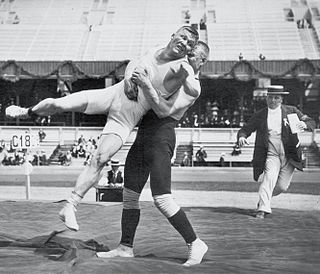
Greco-Roman, Graeco-Roman, or classic wrestling is a style of wrestling that is practiced worldwide. Greco-Roman wrestling was included in the first modern Olympic Games in 1896 and has been in every edition of the summer Olympics held since 1904. This style of wrestling forbids holds below the waist, which is the main feature that differentiates it from freestyle wrestling. This restriction results in an emphasis on throws, because a wrestler cannot use trips to bring an opponent to the ground or hook/grab the opponent's leg to avoid being thrown.

Poland competed at the 1980 Summer Olympics in Moscow, USSR. 306 competitors, 232 men and 74 women, took part in 162 events in 21 sports.

Poland competed at the 1996 Summer Olympics in Atlanta, United States. 165 competitors, 126 men and 39 women, took part in 126 events in 20 sports.
The Greco-Roman heavyweight was one of four Greco-Roman wrestling weight classes contested on the Wrestling at the 1908 Summer Olympics programme. Like all other wrestling events, it was open only to men. The heavyweight was the heaviest weight class, allowing wrestlers over 93 kilograms (205 lb). Each nation could enter up to 12 wrestlers.

Finland competed at the 1920 Summer Olympics in Antwerp, Belgium for the first time as a fully independent state. It did compete at the previous Olympics, however, only as the Russian-dependent Grand Duchy of Finland. 63 competitors, 62 men and 1 woman, took part in 51 events in 9 sports.

Alfred Johan "Alpo" Asikainen was a Finnish wrestler who competed in the 1912 Summer Olympics, winning the bronze medal.
Edil Albert Rosenqvist was a Finnish wrestler and Olympic medalist in Greco-Roman wrestling.
Henri Deglane was a French wrestler. He was an Olympic Champion in Greco-Roman wrestling and AWA World Champion.

Rajmund Badó was a Hungarian wrestler who competed in the 1924 Summer Olympics and the 1928 Summer Olympics. At the 1924 Summer Olympics, he won the bronze medal in the Greco-Roman wrestling heavyweight class.
The men's Greco-Roman bantamweight was a Greco-Roman wrestling event held as part of the Wrestling at the 1924 Summer Olympics programme. It was the first appearance of the event. Bantamweight was the lightest category, including wrestlers weighing up to 58 kilograms.
The men's Greco-Roman middleweight was a Greco-Roman wrestling event held as part of the Wrestling at the 1924 Summer Olympics programme. It was the fourth appearance of the event. Middleweight was the third-heaviest category, including wrestlers weighing 67 to 75 kilograms.
The men's Greco-Roman light heavyweight was a Greco-Roman wrestling event held as part of the Wrestling at the 1924 Summer Olympics programme. It was the fourth appearance of the event. Light heavyweight was the second-heaviest category, including wrestlers weighing 75 to 82.5 kilograms.
The men's Greco-Roman light heavyweight was a Greco-Roman wrestling event held as part of the Wrestling at the 1956 Summer Olympics programme. It was the tenth appearance of the event. Light heavyweight was the second-heaviest category, including wrestlers weighing up to 87 kilograms.
The men's Greco-Roman heavyweight was one of thirteen wrestling events held as part of the wrestling at the 1928 Summer Olympics programme. The competition was held from August 2 to 5, and featured 15 wrestlers from 15 nations.
The men's Greco-Roman welterweight competition at the 1932 Summer Olympics in Los Angeles took place from 4 August to 7 August at the Grand Olympic Auditorium. Nations were limited to one competitor. It was the first appearance of the event; at the previous two Olympics, the welterweight class had been exclusive to freestyle wrestling. This weight class was limited to wrestlers weighing up to 72 kg.
The men's Greco-Roman middleweight competition at the 1936 Summer Olympics in Berlin took place from 6 August to 9 August at the Deutschlandhalle. Nations were limited to one competitor. This weight class was limited to wrestlers weighing up to 79kg.
The men's Greco-Roman heavyweight competition at the 1948 Summer Olympics in London took place from 3 to 6 August at the Empress Hall, Earls Court Exhibition Centre. Nations were limited to one competitor.
The men's Greco-Roman light heavyweight competition at the 1952 Summer Olympics in Helsinki took place from 24 July to 27 July at Messuhalli. Nations were limited to one competitor.
The men's Greco-Roman heavyweight competition at the 1952 Summer Olympics in Helsinki took place from 24 July to 27 July at Messuhalli. Nations were limited to one competitor.
The men's Greco-Roman light heavyweight competition at the 1960 Summer Olympics in Rome took place from 26 to 31 August at the Basilica of Maxentius. Nations were limited to one competitor.





